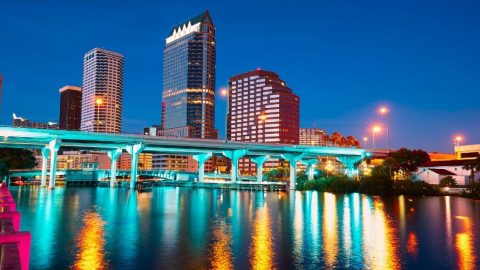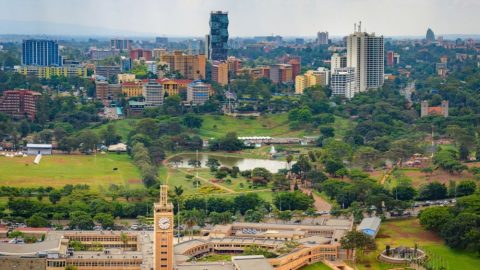(CNN) — In 2019, the Sicilian town of Cammarata made headlines around the world with its daring bid for new residents.
There was just one problem. So many people applied for the scheme that the town authorities were overwhelmed. Without staff dedicated to the project, the project stalled — and then Covid hit. Not a single house was given away.
“Thanks to all the publicity, we had a lot of requests,” says Giuseppe Mangiapane, mayor of Cammarata, who took office midway through the pandemic in October 2020.
“Cammarata is a stunning town — it’s like the panoramic terrace of inland Sicily, because you can admire all the marvels of the island — even Etna’s eruptions, many miles away, from here. Anyone who comes falls in love immediately.
“However, unfortunately, the pandemic starting the same year as the project was launching, blocked everything.”
But as the pandemic progressed, something else started happening. Cammarata’s younger generation started returning home.
All over the world in 2020, people were reassessing their lives, and many were moving away from cities to the countryside. In Italy, that culminated in a mini reversal of the exodus from countryside to city that has been going on since the postwar period. Suddenly, with the arrival of remote working, setting up home in one of Italy’s “borghi” — small, rural, and usually inaccessible towns — was possible.
And in Cammarata — one of many Sicilian towns which had been in a steady decline — things were no different. Young people who’d moved out to seek their fortune were coming back.
Ornella Ancona, 28, is one of them. She’d left Sicily almost a decade ago, to study and travel abroad, and had settled in the UK for the past five years. But in January 2021, she came back.
“The pandemic radically changed the view we had of life — it made me want to come back to Sicily for a bit,” she says.
“I came back wanting to reconnect to the land I came from, and to its people. The peacefulness of this place, and the genuine affection of the people have been the best possible remedy after such a complex year.
“Cammarata represents my home, my roots, but also a place unchanged by time, with traditions that have never changed.”
One way they hope to bring the old town back to life? By rebooting that free homes scheme.
New blood needed

The town sits high in the hills of the center of Sicily.
StreetTo
This time round, the scheme is running a little differently than it has in other towns.
Rather than it being a first come first served prospect, the StreetTo volunteers will be on hand to quiz would-be buyers about what they’re looking for, their plans for their new home, and to tell them more about the town, and Sicily.
The idea is not to create a town of holiday homes which are beautifully done up but rarely inhabited, but to build an entirely new community.
There’s no need to worry about being an incomer to a small town, says Martina Giracello, a 29-year-old architect who returned to Cammarata from London in 2019, having decided she couldn’t be apart from her hometown any longer, but also with this project in mind.
“Buyers must understand that they’re welcome — we are truly open to this idea, that’s why we’re doing it,” she says.
“We understand it’s an opportunity for others, not just us. They’ll have the freedom to find themselves in a place they can call home, they can construct a life here, and be part of a society with active citizens. That’s what we’re hoping for. We want to make the centro storico live again thanks to them.”
While some might worry that an influx of foreigners might change the culture of such a small town, Giracello says that in fact cultural exchange has always been a crucial part of Sicily’s history.
This has long been an island of migration — over the years, countless Sicilians have been forced to leave their island in search of work — and she says that means even the most insular locals understand why people move.
“Many people left in the 1960s and 1970s, so many of those who are left had relatives who had to leave, and they understand the need to leave your home, and why people move. Some people coming here will be doing what we did in the past.
“My generation and the one above it is used to seeing people from different cultures and countries, and our grandparents are used to seeing people leave and come back. They understand that the world is in movement, and that everyone can bring something new and different to us.”
Many of those already interested are Argentinians whose families migrated from Sicily two or three generations back, but want to build a more stable life, she says. They’ve also had many enquiries from Iran — people who “want to totally change their life,” she says. All have their own ideas, from an Argentinian dance school to an American who wanted to open a pizzeria.
But, she says, what might at first seem like radical changes for the town, might actually not be as radical as they look.
“Some people recently wanted to open a vegan restaurant, something that seems impossible here, as we don’t have the concept of vegan food,” she says.
“However, we do have the concept of the land, and of producing things from the land. If you call it ‘vegan’ it seems strange, but call it ‘zero kilometer food’ and it suddenly seems great.”
Investing in the future

The 15 volunteers mostly returned to Cammarata during the pandemic.
StreetTo
Unlike some other towns, which are selling houses to anyone who wants to take them on, Cammarata is looking to build a real community.
“Our main objective is to give a chance to those who feel Cammarata is the ideal place to live, and to taste the authentic life of a Sicilian borgo — but obviously there’s space for people who want to invest in tourist activities, too,” says Mangiapane.
“We’ll collate the requests. As soon as they arrive, they’ll be evaluated for their attitude in why they’re coming to us,” says Giracello. “So, for example, someone who wants to build a new life or start a business here will be seen in a better way [than someone simply wanting to buy a second home].”
They’ll also take potential buyers on tours of the houses when they come to visit.
The StreetTo volunteers will then put their recommendations across to the town authorities, who will take the final decision.
For those lucky enough to score a house, there’s another bonus — although the project is technically a €1 scheme, you’ll be given the house for free.
And since most of the “free” houses will need extensive restoration — around €60,000-€80,000 ($73,000-$97,000) to rebuild, says Giracello — they are also identifying houses in a better state. These will be sold for a higher price, though with lower refurb fees they’ll work out cheaper. A €5,000 ($6,000) house, for example, could be refurbished for as little as €20,000 ($24,000).
If you get a house, you’ll also be living alongside some of the volunteers and other younger people wanting to move back to the town.
“I’m looking for one too,” says Giracello. “I love the centro storico. And I’m not the only one. We want to make it live as it once was lived in — there were little shops, bars, that are not there anymore.”
Other returnees and young families are looking to buy, she says. And “lots of young couples have started working on their grandparents’ old houses.”
The historic center isn’t totally abandoned, says Giracello — in fact, her grandmother still lives there. “When people wanted to live in a more modern way, they moved. San Giovanni Gemini [a modern town linked to Cammarata] is flatter, easier to move around, with wider streets, whereas the centro storico of Cammarata has all the standard issues of historic centers in Italy: narrow roads, on a hill, and lots of going up and down via staircases.
“For some, that’s not practical, but others stayed there — like my nonna.
“But we realized that foreigners don’t feel the same way. They don’t mind about leaving the car 100 meters away and doing the rest on foot — in fact, they have realized that what for us is a problem is for them an opportunity not to be tied to things like a car.
“And my nonna goes shopping on foot and climbs back up the stairs to her house. We need to rediscover old habits.”
The return to the simple life

The hilltop town enjoys spectacular views across Sicily.
Shutterstock
For the millennials of Cammarata, rediscovering old habits goes right back to their roots.
“Most of us have been abroad, and lived outside Sicily, some in the UK, some in Milan, and some going around the world. Many of us were away during Covid,” says Giracello, who’d lived in Spain as well as London.
“But having lived this experience far from home, the desire to return was stronger than before. So we decided to try again to create something in the town.”
They’re a diverse bunch. Giracello is an architect, as is another volunteer. Then there are designers, photographers, marketing executives, translators, and tour guides — all of whom have returned home after spending time abroad. Some have even brought their foreign spouses with them. “They give us a different point of view about what’s going on here, and that’s fundamental,” says Giracello.
The Covid-19 pandemic hasn’t just pushed the volunteers to return to Cammarata; Giracello says it’s changed the type of requests coming through for the €1 houses.
“After what we’ve been through, we’re all looking to make changes — people say, ‘I’m tired of the life I was living.’ Work devoured them — the anxiety of always being ‘on’ for work made them realize they need to do something else.
“In London, I was only free at weekends. Here, yesterday, I went to the beach. If you want to do something bigger, like go to an event or a book launch, you can be in Palermo [Sicily’s capital] in 90 minutes. It took me the same amount of time to get from my home to my office in central London. Distance is relative.”
With the rise in working from home, she says this is the perfect time to make a radical change.
“Working from home in a city, you don’t have the freedom you thought. I was here during lockdown, but we were free to roam around the mountains, go on our bikes and take walks. Lots of people just want a good life, and they see it here. The freedom to move around even a few miles, to take advantage of the mountains and the sea, but mainly the tranquility.
“We’ve had a lot of requests from people looking for houses in the countryside where they can have a vegetable patch and keep chickens They see it as a place where they can live well, cheaply. Some want to spend half the year here and half in their country; others say, enough, I can’t take any more of a city.”
Those interested in country houses will be redirected to local estate agents, however; the volunteers’ goal is strictly focused on the town center.
A revitalized old town

Locals can get out into the mountains on their lunch break.
StreetTo
With the help of the volunteers, the center of Cammarata is already starting to see more life. Last summer they launched an outdoor cinema, projecting films on a wall of an abandoned house and sitting on the patio.
They also organized an open-air art exhibition, which drew locals who’d never been in the old town, she says: “The streets were full of people who’d never set foot on these streets.” By reintroducing the locals to the historic center, they’ll gain a new love for it, she hopes and keep the history going.
One of the volunteers’ mottoes is that the future is inspired by the past.
“It always will be,” says Giracello.
“We’re trying to take some of the traditions and values of the past to go forward — like that cinema. In the old days, people sat outside, chatting about their days. Now the streets can be lived in the same way, meeting others at the cinema or the exhibition.”
For the returnees, Cammarata means everything.
“We’ve always been linked, and we’ve missed it when we’ve been away,” she says.
“When I was in London I missed my family, I missed the food, I missed the tomato sauce we made at home. Every June, there’s a huge festival in town and when I was in Spain I watched it live, thinking I wanted to be there.
“We feel we’re detaching too much from what we were, and what we are.”
And she thinks that, post-Covid, that old-style life will be in demand, even from people who’ve never lived it.
“Walking around, people say hi, and when I’m going around looking at houses to put on our website, people ask what I’m looking for, invite me in, give me freshly cooked bread. They’re not so open in other places.”
The unexpected upside of the pandemic

The aim is to revitalize the old city center.
StreetTo
Through their site, going live this weekend, they’ll offer advice on buying a home, moving to Italy and starting a business — only this week, Giracello was advising an Argentinian physical therapist about what he’d need to transfer his practice here.
“It’s an opportunity for us to construct a better future for everyone in the town,” she says.
And she says that it needs to work, in order to save the town,
“I came home because I felt the need to try something before leaving again. Leaving is easy; trying something and hoping your idea will take off is much harder than going to another city.
“We’re all trying to take advantage of the situation that Covid has created — which has allowed everyone to understand values that we hadn’t considered before. We want to rediscover them — and do something beautiful with them.”
Mayor Mangiapane is feeling positive. “We want to repopulate and revitalize the old town, creating a new fabric of meeting and exchange,” he says.
“We want young people to grow up open, with the conviction that cultural exchange is innovation, and that from meeting new people we can get new ideas and new points of view.
“I think the arrival of outsiders can really stimulate that idea.”
Ornella Ancona agrees.
“I’d love the beauty of these places to be shared with the world that’s too absorbed by the freneticism of modern life,” she says.
“We forget that places like this still exist.”
Not, hope the millennials of Cammarata, for much longer.





Recent Comments